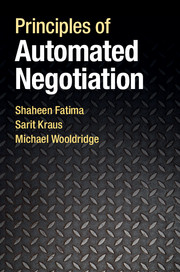Book contents
- Frontmatter
- Dedication
- Contents
- List of illustrations
- Preface
- Acknowledgements
- Summary of key notation
- 1 Introduction
- 2 Games in normal form
- 3 Games in extensive form
- 4 Negotiation domains
- 5 Strategic analysis of single-issue negotiation
- 6 Strategic analysis of multi-issue negotiation
- 7 The negotiation agenda
- 8 Multilateral negotiations
- 9 Heuristic approaches
- 10 Man–machine negotiations
- 11 Axiomatic analysis of negotiation
- 12 Applications
- 13 Related topics
- 14 Concluding remarks
- Appendix A Proofs
- References
- Index
1 - Introduction
Published online by Cambridge University Press: 05 November 2014
- Frontmatter
- Dedication
- Contents
- List of illustrations
- Preface
- Acknowledgements
- Summary of key notation
- 1 Introduction
- 2 Games in normal form
- 3 Games in extensive form
- 4 Negotiation domains
- 5 Strategic analysis of single-issue negotiation
- 6 Strategic analysis of multi-issue negotiation
- 7 The negotiation agenda
- 8 Multilateral negotiations
- 9 Heuristic approaches
- 10 Man–machine negotiations
- 11 Axiomatic analysis of negotiation
- 12 Applications
- 13 Related topics
- 14 Concluding remarks
- Appendix A Proofs
- References
- Index
Summary
In our everyday lives, negotiation is ubiquitous. At work, we bargain with clients about the terms of a contract; we bargain with our boss about a pay rise when the contract is signed. At home, we bargain with our partners about who will tidy the house; we bargain with our children about how many stories they can read before bed. And politicians, of course, routinely bargain in situations that have life or death consequences. The purpose of negotiation is to reach an agreement, and in particular, agreement in the presence of conflicting goals and preferences. If your preferences, goals, and aspirations were completely aligned with mine, then there would be no conflict, and hence there would be no need for negotiation. In this case, the best outcome for me would also be the best outcome for you, and so we could simply determine such an outcome, and then implement it. Neither of us would have any incentive other than to find such a mutually optimal best outcome – our joint problem is nothing more than an optimisation problem. Unfortunately, of course, the real world is not like that. More often than not, people have very different goals and preferences, and when this occurs, some method is required to find an outcome that will be acceptable to all concerned. Negotiation provides such a mechanism.
- Type
- Chapter
- Information
- Principles of Automated Negotiation , pp. 1 - 16Publisher: Cambridge University PressPrint publication year: 2014

